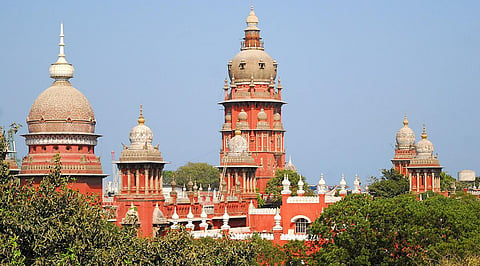

CHENNAI: The Madras High Court on Wednesday directed the National Commission for Scheduled Castes (NCSC) to issue fresh summons to Murasoli Trust on the row over the nature of the land at Kodambakkam, on which, the office of the DMK mouthpiece Murasoli was constructed.
Striking down the earlier summon issued by the then vice-chairman of NCSC L Murugan, who is currently a Central Minister, Justice SM Subramaniam ordered, “The first respondent/NCSC is directed to issue fresh notice to the parties in the manner contemplated and by following the Rules of Procedures.”
He also directed the Commission to proceed with the inquiry by “affording opportunity to all the parties” and pass appropriate orders on merits and in accordance with the law, uninfluenced by the observations made in this order relating to disputed facts.
The judge dismissed the petition filed by RS Bharathi, managing trustee of Murasoli Trust, seeking to quash the earlier summon issued in 2019 by Murugan for inquiry into the allegations that the land is Panchami land based on a complaint filed by BJP’s state secretary R Srinivasan.
The judge said that the documents produced by the Tamil Nadu government and the respondents and inconsistencies pointed out by Srinivasan’s counsel with reference to the said documents and revenue records “would be sufficient to form an opinion that disputed facts exist”.
“Such disputed facts relating to immovable properties cannot be adjudicated in the present writ proceedings. The complaint before the NCSC is that the Panchami lands allotted to scheduled caste members were transferred to other persons in an illegal manner. Thus an investigation and an inquiry by the commission is warranted for the purpose of ascertaining the truth regarding the character of the land in safeguarding and protecting the interest of the scheduled caste members,” the judge observed.
He held that the notices issued by the commission to the writ petitioner to appear before the third respondent Murugan lost their relevance since he came to be appointed as a Minister and presently not holding the post of vice-chairman of NCSC.
Referring to the arguments that the Commission cannot hold an inquiry into the rights of the property, which is civil in nature, the judge said the primary duty of the Commission is to provide safeguards and other measures for the protection, welfare and socio-economic development of the SCs and an elaborate reading of Article 338(5) (b) mentions the duty of the Commission to inquire into the specific complaints with respect to the deprivation of rights and safeguards.
Holding that Panchami land is purely for the benefit of the SCs and any encroachment is illegal and strikes at the root of their legal rights, Justice Subramaniam said, “It squarely falls within the ambit of the NCSC to probe any such complaints with respect to the deprivation of rights and safeguards of the SCs. It is the duty of the Commission to inquire into any such illegal occupation of Panchami lands”.
The language employed in Article 338(5) (a) of the Constitution, is to investigate and monitor all matters relating to the safeguards provided for the SCs. Therefore, it is not as if the NCSC has no jurisdiction to inquire into the land matters, he ruled.
The court cannot presume that the Commission will exceed its powers while conducting inquiry or passing final orders. Mere presumption cannot be the ground to issue a writ of prohibition, the judge said referring to Bharathi’s prayer for stopping the Commission from hearing the complaints.
As far as the allegation of political motive and malafide in sending the summons is concerned, the judge explained that more than the political parties involved in the dispute, the nature of the dispute is what ought to be examined at the first instance since the court is most importantly concerned about the constitutional and legal rights of the public at large.